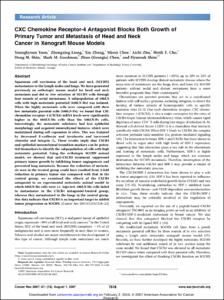CXC Chemokine Receptor-4 Antagonist Blocks Both Growth of Primary Tumor and Metastasis of Head and Neck Cancer in Xenograft Mouse Models
- Keimyung Author(s)
- Choe, Mi Sun
- Department
- Dept. of Pathology (병리학)
- Journal Title
- Cancer Research
- Issued Date
- 2007
- Volume
- 67
- Issue
- 15
- Abstract
- Squamous cell carcinoma of the head and neck (SCCHN) metastasizes to the lymph nodes and lungs. We have generated previously an orthotopic mouse model for head and neck metastasis and did in vivo selection of SCCHN cells through four rounds of serial metastases. A subpopulation of 686LN cells with high metastatic potential (686LN-Ms) was isolated. When the highly metastatic cells were compared with their low metastatic parental cells (686LN-Ps), we found that CXC chemokine receptor-4 (CXCR4) mRNA levels were significantly higher in the 686LN-Ms cells than the 686LN-Ps cells. Interestingly, the metastatic subclones had lost epithelial morphology and acquired mesenchymal features, which were maintained during cell expansion in vitro. This was featured by decreased E-cadherin and involucrin and increased vimentin and integrin β1. These results imply that CXCR4 and epithelial-mesenchymal transition markers can be potential biomarkers to identify the subpopulation of cells with high metastatic potential. Using the orthotopic SCCHN animal model, we showed that anti-CXCR4 treatment suppressed primary tumor growth by inhibiting tumor angiogenesis and prevented lung metastasis. Because the reduction of metastasis seen in the treated group could have resulted from 2-fold reduction in primary tumor size compared with that in the control group, we examined the effects of the CXCR4 antagonist in an experimental metastatic animal model in which 686LN-Ms cells were i.v. injected. 686LN-Ms cells failed to metastasize in the CXCR4 antagonist-treated group, whereas they metastasized to the lungs in the control group. Our data indicate that CXCR4 is an important target to inhibit tumor progression in SCCHN. [Cancer Res 2007;67(15):7518–23]
squamous cell carcinoma
CXCR4
tumor angiogenesis
metastasis
epithelial mesenchymal transition
- Keimyung Author(s)(Kor)
- 최미선
- Publisher
- School of Medicine
- Citation
- Younghyoun Yoon et al. (2007). CXC Chemokine Receptor-4 Antagonist Blocks Both Growth of Primary Tumor and Metastasis of Head and Neck Cancer in Xenograft Mouse Models. Cancer Research, 67(15), 7518–7524. doi: 10.1158/0008-5472.CAN-06-2263
- Type
- Article
- ISSN
- 0008-5472
- Appears in Collections:
- 1. School of Medicine (의과대학) > Dept. of Pathology (병리학)
- 파일 목록
-
-
Download
 oak-aaa-00820.pdf
기타 데이터 / 488.03 kB / Adobe PDF
oak-aaa-00820.pdf
기타 데이터 / 488.03 kB / Adobe PDF
-
Items in Repository are protected by copyright, with all rights reserved, unless otherwise indicated.